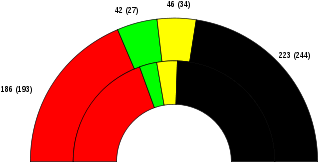
German federal election, 1987
Encyclopedia
The 11th German federal election, 1987 was conducted on 25 January 1987, to elect members to the Bundestag
, the parliament of the Federal Republic of Germany
.
, vice chairman of SPD, tried to become Chancellor. His campaign suffered from internal party quarrels and a lack of perspectives to build a majority coalition: in those days, the Greens were divided over the question of whether to take part in governments.
One of the major issues in this election was the environment, after the Chernobyl disaster
and other accidents.

as Chancellor. The Greens came into parliament for the second time and seemed to be established on federal level.
Bundestag
The Bundestag is a federal legislative body in Germany. In practice Germany is governed by a bicameral legislature, of which the Bundestag serves as the lower house and the Bundesrat the upper house. The Bundestag is established by the German Basic Law of 1949, as the successor to the earlier...
, the parliament of the Federal Republic of Germany
West Germany
West Germany is the common English, but not official, name for the Federal Republic of Germany or FRG in the period between its creation in May 1949 to German reunification on 3 October 1990....
.
Issues and Campaign
Johannes RauJohannes Rau
Johannes Rau was a German politician of the SPD. He was President of Germany from 1 July 1999 until 30 June 2004, and Minister-President of North Rhine-Westphalia from 1978 to 1998.-Education and work:...
, vice chairman of SPD, tried to become Chancellor. His campaign suffered from internal party quarrels and a lack of perspectives to build a majority coalition: in those days, the Greens were divided over the question of whether to take part in governments.
One of the major issues in this election was the environment, after the Chernobyl disaster
Chernobyl disaster
The Chernobyl disaster was a nuclear accident that occurred on 26 April 1986 at the Chernobyl Nuclear Power Plant in Ukraine , which was under the direct jurisdiction of the central authorities in Moscow...
and other accidents.
Results
| Party | Party List votes | Vote percentage (change) | Total Seats (change) | Seat percentage | |||
|---|---|---|---|---|---|---|---|
| Christian Democratic Union (CDU) | 13,045,745 | 34.4% | -3.7% | 174 | -17 | 35.0% | |
| Christian Social Union (CSU) | 3,715,827 | 9.8% | -0.8% | 49 | -4 | 9.9% | |
| Free Democratic Party Free Democratic Party (Germany) The Free Democratic Party , abbreviated to FDP, is a centre-right classical liberal political party in Germany. It is led by Philipp Rösler and currently serves as the junior coalition partner to the Union in the German federal government... (FDP) |
3,440,911 | 9.1% | +2.2% | 46 | +12 | 9.3% | |
| Social Democratic Party Social Democratic Party of Germany The Social Democratic Party of Germany is a social-democratic political party in Germany... |
14,025,763 | 37.0% | -1.2% | 186 | -7 | 37.4% | |
| The Greens Alliance '90/The Greens Alliance '90/The Greens is a green political party in Germany, formed from the merger of the German Green Party and Alliance 90 in 1993. Its leaders are Claudia Roth and Cem Özdemir... |
3,126,256 | 8.3% | +2.7% | 42 | +15 | 8.5% | |
| All Others | 512,817 | 1.3% | 0 | 0.0% | |||
| Totals | 37,867,319 | 100.0% | 497 | -1 | 100.0% | ||

Post-election
The coalition between the CDU/CSU and the FDP returned to government, with Helmut KohlHelmut Kohl
Helmut Josef Michael Kohl is a German conservative politician and statesman. He was Chancellor of Germany from 1982 to 1998 and the chairman of the Christian Democratic Union from 1973 to 1998...
as Chancellor. The Greens came into parliament for the second time and seemed to be established on federal level.

